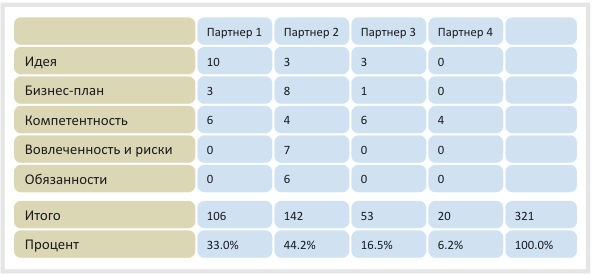Cut a startup. Demmler Calculator
The ultimate goal of any startup is money. Whether it will be a successful profitable business or a profitable sale to larger market players depends on each individual company. Someone wants to get their millions from Google, someone does not mind becoming a Google. Of course, the idea, self-expression, ambition is important - not without it. But in the end, if you do not believe that a startup will bring millions, then you should not start. Let's talk about how to share shares in a startup between the founders of the company.
In the American tradition, startups are taken to take in the share of all project participants working from the first day of its foundation. A great way to motivate a team, I tell you. But how to share fabulous profits, if they do? The very first thing that comes to mind is to divide equally. Thus, if five people worked on a startup, then everyone will get 20%. Right? Not really.
Americans have a great saying about chicken and pig “a chicken is involved with breakfast, but a pig is committed”: talking about bacon and eggs for breakfast, which requires some effort from the chicken to make (tear an egg and live calmly on) while the pig will have to make a much more substantial sacrifice. It is the same in business: some project participants do the job fairly formally and then monitor the results, while others carry fundamentally greater risks and invest in the business more.
')
Frank Demmler, a professor of entrepreneurship at a business school at Carnegie Mellon University, proposed the following method for distributing shares in a startup.
Briefly describe each element.
Idea. Everything is clear here: IT startups are more dependent on the uniqueness of the idea.
Preparation of a business plan. Anyone who has written a business plan at least once will agree that this is not an easy task. It is in the process of working on this document that the details are worked out, weak points are thought out, a promotion strategy is being developed. And, although writing a business plan is undoubtedly an important and time-consuming stage, the task is an order of magnitude more difficult to bring it to life.
Competence. How competent are you and your partners in your startup industry? Experience, communication, and understanding of technology are key success factors in almost any business.
Involvement and risks. Returning to the chicken and the pig: someone will have to quit their main job, stay up at night, communicate with employees when there is no money for wages. How much your partners are involved in the business and are worried about its success, how big the stakes are for each of them.
Duties. Everything is simple here. Who is responsible for what.
Of course, other factors may also be key for your business, such as: attracting partners, building sales channels or supply chains.
For each company, the ratio of the importance of each factor will be different: the restaurant, for example, the idea is not as important as competent execution, that is, good cuisine and well-organized service. While an IT startup will never become a new Google without a fundamentally new technology. So, let us estimate the importance of each factor for your company on a scale from 0 to 10.

Now you need to think and evaluate the contribution of each employee to the common cause on the above parameters. Who worked on the business plan? Who has the main connections with industry leaders? Who is involved in attracting investment? Who is involved in bringing the product to market?

For example:
Consider a hypothetical example. Suppose we are talking about an IT startup founded by four university graduates.
1. Idea generator, technology expert.
2. Responsible for the business component.
3. Technology Specialist, the right hand of the first partner.
4. Analyst. A person who is at the right time in the right place, but does little to help the development of the company and does not understand the technology.
If it were inexperienced entrepreneurs, everyone would get 25%, because it is “honest.”
But let's see what the calculator says. We evaluate the importance of each factor and the contribution of each participant:

Now we add up the indicators of each partner, multiply by the degree of importance of the factor and determine the percentage ratio.

With all the simplicity, the Demmler calculator helps to more or less objectively evaluate the contribution of each startup member and the share due to him without unnecessary disputes. In this case, the author advises to take into account both the real merits of the partners, and past and potential ones, as well as not to forget about common sense and remember that the results are more of a recommendation.
Original article: www.andrew.cmu.edu/user/fd0n/35%20Founders%27%20Pie%20Calculator.htm
Posted by: Frank Demmler
We shared an orange, a lot of us, and he is one
In the American tradition, startups are taken to take in the share of all project participants working from the first day of its foundation. A great way to motivate a team, I tell you. But how to share fabulous profits, if they do? The very first thing that comes to mind is to divide equally. Thus, if five people worked on a startup, then everyone will get 20%. Right? Not really.
Americans have a great saying about chicken and pig “a chicken is involved with breakfast, but a pig is committed”: talking about bacon and eggs for breakfast, which requires some effort from the chicken to make (tear an egg and live calmly on) while the pig will have to make a much more substantial sacrifice. It is the same in business: some project participants do the job fairly formally and then monitor the results, while others carry fundamentally greater risks and invest in the business more.
')
Frank Demmler, a professor of entrepreneurship at a business school at Carnegie Mellon University, proposed the following method for distributing shares in a startup.
Step 1.
We determine the main elements of the contribution to the creation of a startup. Demmler offers the following: Idea, preparation of a business plan, competence in the field of the company's activity, involvement and risks, responsibilities.Briefly describe each element.
Idea. Everything is clear here: IT startups are more dependent on the uniqueness of the idea.
Preparation of a business plan. Anyone who has written a business plan at least once will agree that this is not an easy task. It is in the process of working on this document that the details are worked out, weak points are thought out, a promotion strategy is being developed. And, although writing a business plan is undoubtedly an important and time-consuming stage, the task is an order of magnitude more difficult to bring it to life.
Competence. How competent are you and your partners in your startup industry? Experience, communication, and understanding of technology are key success factors in almost any business.
Involvement and risks. Returning to the chicken and the pig: someone will have to quit their main job, stay up at night, communicate with employees when there is no money for wages. How much your partners are involved in the business and are worried about its success, how big the stakes are for each of them.
Duties. Everything is simple here. Who is responsible for what.
Of course, other factors may also be key for your business, such as: attracting partners, building sales channels or supply chains.
Step 2. The relative importance of factors.
For each company, the ratio of the importance of each factor will be different: the restaurant, for example, the idea is not as important as competent execution, that is, good cuisine and well-organized service. While an IT startup will never become a new Google without a fundamentally new technology. So, let us estimate the importance of each factor for your company on a scale from 0 to 10.

Step 3. Evaluation of the personal contribution of each partner
Now you need to think and evaluate the contribution of each employee to the common cause on the above parameters. Who worked on the business plan? Who has the main connections with industry leaders? Who is involved in attracting investment? Who is involved in bringing the product to market?

For example:
Consider a hypothetical example. Suppose we are talking about an IT startup founded by four university graduates.
1. Idea generator, technology expert.
2. Responsible for the business component.
3. Technology Specialist, the right hand of the first partner.
4. Analyst. A person who is at the right time in the right place, but does little to help the development of the company and does not understand the technology.
If it were inexperienced entrepreneurs, everyone would get 25%, because it is “honest.”
But let's see what the calculator says. We evaluate the importance of each factor and the contribution of each participant:

Now we add up the indicators of each partner, multiply by the degree of importance of the factor and determine the percentage ratio.

With all the simplicity, the Demmler calculator helps to more or less objectively evaluate the contribution of each startup member and the share due to him without unnecessary disputes. In this case, the author advises to take into account both the real merits of the partners, and past and potential ones, as well as not to forget about common sense and remember that the results are more of a recommendation.
Original article: www.andrew.cmu.edu/user/fd0n/35%20Founders%27%20Pie%20Calculator.htm
Posted by: Frank Demmler
Source: https://habr.com/ru/post/106867/
All Articles